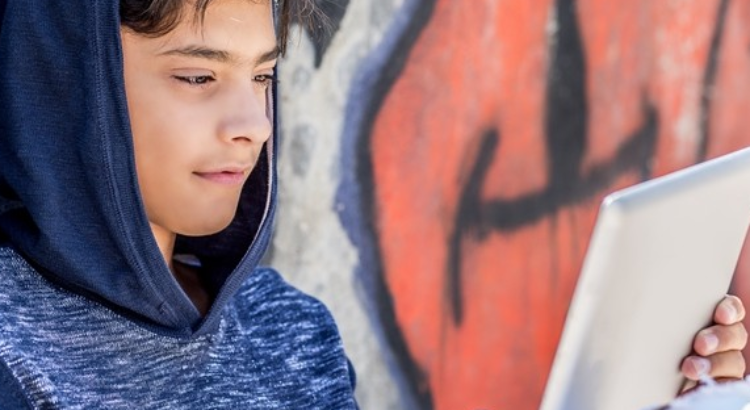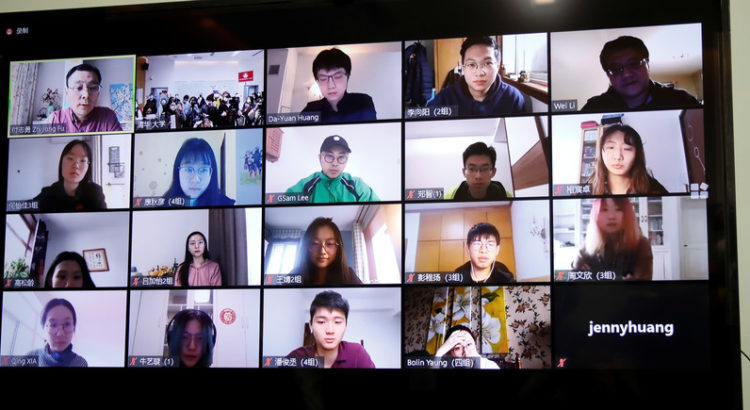UNESCO
Algeria
- ONEFD (link is external) – The National Bureau for Distance Education and Training (Office national d’éducation et de formation à distance) of the Ministry of Education provides online learning platforms in different subjects for all academic levels.
Argentina
- Seguimos educando (link is external) – Video lessons by subject for primary/secondary levels and materials for teachers to prepare them for online teaching.
- Biblioteca Digital (link is external) – A portal for students and teachers for all schools in the country to access more than a hundred classical books and novels.
Austria
- BMBWF (link is external) – Website of the Austrian Ministry of Education, Science and Research dedicated to assist students and teachers with links, resources and information in support of distance learning.
- Eduthek.at (link is external) – Resource portal of the Ministry with teaching materials for primary and secondary schools, sorted by subjects.
Azerbaijan
- Elektron Dərslik Portalı (link is external) – Electronic Textbook Portal – An e-books portal linked on the Azerbaijani Ministry of Education website.
Bahrain
- EduNET (link is external) – Provides various educational services for all school levels and enables communication between faculty members, students and parents. Functions include assignments, discussions, timetables, attendance tracking, school events and announcements.
Belgium
- Enseignement.be (link is external) – Online platform with pedagogical resources for teachers and students from the Wallonia Brussels Federation.
Brazil
- Banco Internacional de Objetos Educacionais (link is external) – An initiative of the Brazilian government that covers open educational content from preschool to university education.
Chile
- Aprendo en línea (link is external) – Online platform providing pedagogical resources for students from 1st grade of primary education to 4th year of secondary school.
China
- National Cloud-Platform for Educational Resources and Public Service (link is external) – Provides continued educational services for millions of students.
Colombia
- Colombiaaprende (link is external) – An online platform created by the Ministry of Education to support teachers, families and students in the process of e-learning in the current context of the Covid-19 pandemic.
Costa Rica
- Aprendo en casa (link is external) – A new strategy and platform created by the Ministry of Education that provides different digital resources in education from early childhood up to secondary schools.
- Caja de herramientas (link is external) – Digital ‘toolbox’ for teachers for conducting distance learning classes created by the Ministry of Education.
Cyprus
- Schools.ac.cy (link is external) – A site supporting teachers in web development and brings access to educational material for all levels of education.
Czech Republic
- Czech Television (link is external) – A television broadcast project programme called UčíTelka (Teachers) providing first grade elementary school TV lessons.
Ecuador
- Recursos educativos digitales (link is external) – Ministry of Education platform for students and teachers to support home learning.
El Salvador
- Material para la continuidad educativa (link is external) – A platform by the Ministry of Education providing pedagogical resources for all students in the context of the current Covid-19 crisis.
Estonia
- Education-nation (link is external) – Ministry of Education providing digital education tools to support remote learning.
Finland
- OPH.fi (link is external) – The new site of the Finnish National Agency for Education to answer the needs of students, teachers and families during the coronavirus outbreak.
France
- Ma classe à la maison (link is external) – The Centre national d’enseignement à distance provides a virtual classroom system accessible via smartphones and computers. Enables teachers to facilitate the organization of distance learning.
Honduras
- Educatrachos (link is external) – Provides content, activities, tools and educational resources in different formats, designed to be used by teachers and students.
Hungary
- Oktatas (link is external) – A collection of resources published by the Ministry of Education for online teaching and learning.
Indonesia
- Rumah Belajar (link is external) – A platform providing learning content, learning management system for digital classroom and other resources that enable its users to interact, communicate online and organize distance learning activities.
- SPADA (link is external) – An e-learning platform provided for free at the moment for students of tertiary education.
Ireland
- Scoilnet (link is external) – The official portal for Irish education offering online resources to support schools, teachers, students and parents.
- PDST (link is external) – A distance learning platform and collection of resources for teachers in order to provide continuity to pupils/students during the health crisis.
Italy
- Nuovo Coronavirus webpage (link is external) – The webpage of the Ministry of Education and Higher Education providing information and guidance for education practitioners and families on the education response to COVID-19.
- INDIRE webinars (link is external) – National Institute for Documentation, Innovation and Educational Research (INDIRE) platform providing webinars for teachers to support them in the adoption of distance learning methodologies and tools.
Iraq
- Educational channel on YouTube (link is external) – Lectures by the educational television for all levels provided by professors and the General Directorate of Curricula and produced by the Educational TV Directorate.
Japan
- MEXT (link is external) – Platform to support e-learning by age, level of education and subject.
- Future Classroom (link is external) – Points users to third party learning platforms.
Republic of Korea
- Educational Broadcasting system (EBS) (link is external) – Provides advanced educational service by offering various multimedia content.
Kuwait
- MOE video channel (link is external) – A dedicated YouTube channel featuring video lessons and conferences from teachers.
Lebanon
- MEHE (link is external) – Official learning application of the Ministry of Education and Higher Education with information for teachers and other education personnel.
Luxembourg
- Multi-Script (link is external)– Provides digital teaching/learning materials for all types of schools in order to actively promote curriculum development.
Malta
- Curriculum.gov.mt (link is external) – Digital resources from the Ministry of Education for students from early years to secondary school.
Mexico
- Aprende en casa por TV y en Línea (link is external) – A program launched by the Ministry of Public Education of Mexico that provides TV lessons and online resources to support learning a home. This programme will trans-mit preschool, primary, secondary and high school education content based on the Ministry of Public Education curricula.
- Aprende 2.0 (link is external) – Resources of the Ministry of Public Education that seeks to promote the use of ICT to foster the development of digital skills.
- TELEsecundaria (link is external) – Previously existing system of distance education programs for high school students in rural areas of the country.
- Libros de texto (link is external) – Digital versions of all free textbooks to support learning at home.
Morocco
- TaalimTice (link is external) – A collection of videos by subject area provided by the Ministry of Education.
Norway
- Feide (link is external) – The Norwegian Directorate for Education and Training and Uninett temporarily opened Feide for free, the national platform for a variety of digital services in education and research.
Panama
- Educapanama (link is external)– Online courses by the Ministry of Education for pre-, primary and secondary school students to follow classes from a distance.
Paraguay
- Tu escuela en casa (link is external) – Provides content, activities, tools and educational resources proposed by the Ministry of Education designed to be used by teachers and students.
- Biblioteca Digital (link is external)– Provides a set of resources to support schools and teachers with educational
materials and the possibility to design lessons directly in the platform.
Peru
- PerúEduca (link is external) – A digital platform provided by the Ministry of Education offering services to the education community.
Portugal
- Apoio à Escolas (link is external)– Set of resources to support schools in the use of distance learning methodologies to enable them to continue teaching and learning processes.
Romania
- Proedus (link is external) – A site containing video courses for preschoolers and primary school students created by the Center for Educational and Sports Projects Bucharest.
- Telescoala (link is external) – Dedicated site of the Romanian national tv to educational programs for 8th, 12th and 13th grades to prepare them for national exams.
Singapore
- Singapore Student Learning Space (link is external)– E-learning portal from the Ministry that provides online learning material for students and supports teachers.
Slovakia
- ucimenadialku.sk (link is external) – a website created by the Ministry of Education, containing webinars, online les-sons, recommendations for teachers, professional staff and parents.
- Viki (link is external) – a portal of educational contents divided by subject area launched by the Ministry of Education.
Slovenia
- SIO (link is external) – National portal for up-to-date information services, a training catalogue, an e-material reposito-ry and technical content support for primary and secondary level students and teachers.
Spain
- INTEF (link is external) –Ministry of Education pedagogical resources to support distance learning.
- Procomún (link is external) – A collection of close to a 100,000 educational resources and learning objects in different formats created by the Spanish Ministry of Education and Science with contributors of the educational community.
- Educlan (link is external) – An online channel supported by the Ministry of Education that presents educational resources during the period of suspension of classes because of the coronavirus.
Switzerland
- Eduport.ch (link is external) – Joint website of the State Secretariat for Education, Research and Innovation and the Swiss Conference of Cantonal Ministers of Education with information, links and resources in support of distance learning.
Thailand
- Digital Learning Centre (link is external) – an online learning platform developed by the Office of Private Education Commission (OPEC) to provide education via internet connection to the general public and all elemen-tary and secondary students nationwide during the coronavirus outbreak.
Turkey
- Remote Educational System (link is external) – The Ministry of National Education will launch a “remote educational system” free of charge on March 23 2020 with a television and internet-based curriculum on a national scale. Some online resources and applications are already available on the Ministry’s website.
Ukraine
- Youtube of the Ministry of Education (link is external)– The Ministry of Education of Ukraine provides a selection of online classes during the coronavirus crisis.
United Arab Emirates
- MOE Library (link is external) – A platform established by The Ministry of Education allowing teachers and students to view and interact with the learning curriculum electronically and download electronic copies of books.
Uruguay
- Plan Ceibal (link is external)– Resources for teachers and students that are accessible from any device, as well as remote programs, which help mitigate the effects of the suspension of educational activities due to temporary closure of educational centers.
Uzbekistan
- UZEDU (link is external) – A collection of resources by the Ministry of Public Education to facilitate learning during school closures.
UNRWA
Resources collected by the United Nations Relief and Works Agency mainly for students in Jordan, Lebanon, Gaza, Syria and the West Bank.
Interactive Learning Programme (link is external) – an app designed for Grades 1-9.
UNRWA TV – provides educational lessons in Arabic, English, mathematics and science for Grades 4-9.
On how to use the resources:
– Arabic (link is external) and English (link is external) Guidelines for parents
– Arabic (link is external)and English (link is external) Guidelines for teachers
Fuente: https://en.unesco.org/themes/education-emergencies/coronavirus-school-closures/nationalresponses










 Users Today : 28
Users Today : 28 Total Users : 35460159
Total Users : 35460159 Views Today : 42
Views Today : 42 Total views : 3418825
Total views : 3418825